Smithco celebrates 50 years of improving turf maintenance
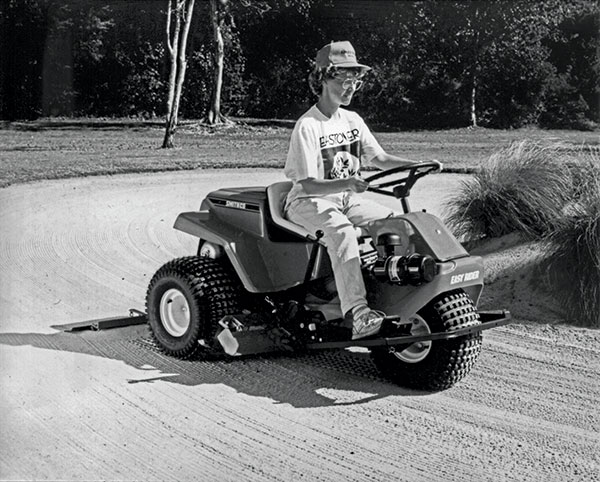
Today Smithco sells its Sand Star line of bunker rakes, but it all started with The Easy Rider. This bunker rake was the first model the company offered.
For Ted Smith, founder of Pennsylvania-based Smithco, his greatest ideas came from the field.
Of course, Ted’s proverbial “field” could be defined as many locales, but none more important than along the fairway. Here he would envision machinery that would ultimately change the way superintendents care for a course.
Following World War II, Ted became a wool broker; a trade that offered skills that he would later use at Smithco. As the world changed after the war, Ted began to see the introduction of synthetic fabrics and anticipated a large decline in the need for wool — he decided to make a change.
At the time, Ted went to work for Tom Mascaro, of the turf business, as his sales manager. While at Turf-Tec International he expanded his own knowledge of the industry and developed valuable relationships in the business and at the distribution level.
“(Ted) eventually decided to start his own company after working with Tom for a number of years,” says Emil Miller, Smithco marketing manager. “He ventured out on his own with the one idea he started the company with — the Red Ryder.”
As Miller suggests, Ted’s entrepreneurial start was a quintessential American story, but for those in the business, it was more about a man who loved golf and was driven to make the game’s courses easier to maintain.
Smithco was founded in 1967 with the Red Ryder, but well before the product was introduced, Smith was on the course visiting with superintendents.
“Most of Ted’s really good ideas came from the field, from talking to superintendents,” says Miller. “Ted spent time learning what they needed and thought about what would ultimately make their jobs better. He learned from them and imagined more efficient tools for the tasks of maintaining a golf course.”
Fifty years later, the Red Ryder remains a symbol of Ted’s curiosity and accomplishments rooted in one common theme — appreciation for maintaining the field.
A family affair
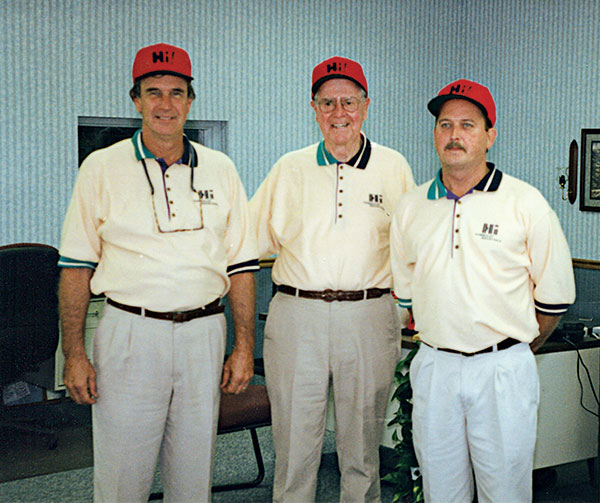
(Center) Ted Smith founded Smithco in 1976 and his son (left) Don Smith now serves as president. The father-son duo are pictured with Plant Manager Larry Johnson.
A family man, Ted raised three children in Wayne, Pa.; he played countless rounds at St. Davids Golf Club, and loved to have a good time.
“Ted was a great guy, great guy to work for, good sense of humor. I never heard him play the piano, but I hear he was a hell of a piano player,” says Miller, a 25-year veteran of the company. “I can’t say enough good things about Ted. He’d tell stories about the old days … I’d sit around and listen.”
Before long, the family man’s company became a family affair; in 1971 Ted’s youngest son, Don Smith, joined the company after returning home from the Vietnam War.
“I think the most interesting thing about Smithco is that my father was 54 when he started the company,” says Don, Smithco president. “The uniqueness of him being at that age was in itself something special.”
It was special — it illustrated a certain drive that was likely ever-present in Ted. It created a visionary who didn’t cave easily.
Don, along with Bill Kenney, vice president, credit the hardworking employees of Smithco for the company’s positive reputation in the turf industry.
Ted was a good judge of character, aiding in building the right team. “He chose the right people and he told them that if everyone does the job they are supposed to do, we will succeed — everyone did what they were supposed to do,” says Don.
For Don, the employees are one of the major factors of Smithco’s 50-year success.
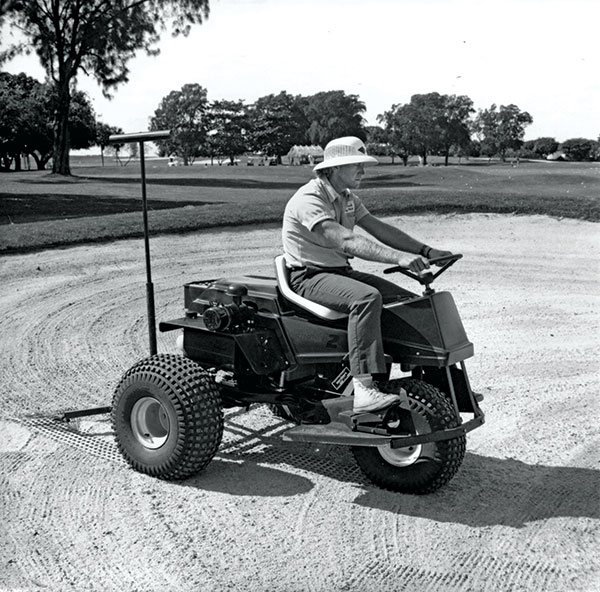
The international company manufactures products in five different categories. While they don’t mow, they provide about every other function needed to keep a course looking pristine.
During Smithco’s growth, Ted acquired manufacturing factories in Kansas, Wisconsin and Texas — today two are still in operation. With each acquisition came the employees, many of whom still work for the company.
“The core employees are very dedicated, and on the manufacturing side of the business, because of the length of time that everybody’s been there — it certainly runs itself,” says Miller of the well-oiled machine currently employing 70 people.
The little machine that could
Serendipitous to the Smithco story is that the Red Ryder was actually born at its Kansas factory in the 1960s.
Ted saw the machine at the Kansas City superintendent’s trade show, where a small manufacturing company was showcasing a small utility vehicle built in a factory located in Humboldt, Kan.
“It was the plant manager that had this idea for a vehicle that … literally he wanted to give to missionaries in third world countries. It was a little machine that was very low to the ground, you could load a lot of stuff into it, easy to operate,” says Miller.
“Ted realized what it could do for the turf industry in those days. There was literally no riding greens mowers until 1967 when Smithco started, so the walking greens mower was a perfect fit.”
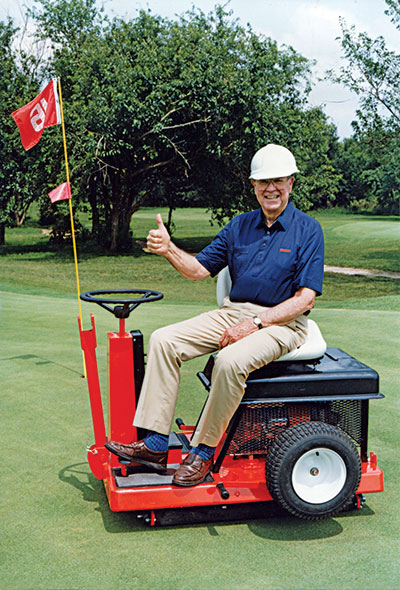
Smithco Founder Ted Smith sits on an early model of the Tournament Greens Rollers. They introduced their first greens rollers in 1992 when the cultural practice was just a “fad.”
Once developed, the three-wheel motorized vehicle with a small tow trailer revolutionized golf course maintenance. Previous to its invention, greenskeepers put tires on the greens mowers and walked from hole to hole. When they got to the green they’d remove the tires and mow the green, then re-attach the tires and go on to the next green.
“It was kind of tedious to get around the golf course,” says Miller.
The Red Ryder solved that very inefficient chore. The design allowed greenskeepers to put at least two mowers in the back of the Red Ryder, now riding from to hole to hole.
“Instead of walking, they could transport, obviously at higher speeds and become a little bit more productive,” says Miller.
“It’s the one product that everyone remembers,” says Don. “We sold a lot of them for about five or six years, then he expanded the company in the ’70s and ’80s to the bunker rakes, sprayers and all the things we have now.” All told, Smithco has sold more than 10,000 Red Ryders in its 50-year existence.
Today the international company manufactures a number of golf course and turf maintenance products among five categories. The specialized equipment does not mow, but provides just about every other function to keep a course or field looking pristine and in good health.
“When we design a product to do a job, it does that job better than anything else,” says Miller. “Our application is what makes Smithco successful. The range of tools and implements that make the job easier is really what sets us apart.”
Smithco grew from the Red Ryder to powered bunker rakes, sprayers and riding sprayers, riding sweepers (which took the company into the baseball market), greens and fairway rollers.
Miller recalls a 1992 trade show in which the company introduced the greens rollers.
“It was a fad back then. When it first started, I told the story many times of being in the booth in New Orleans in ’92 and having superintendents come in and look at it and laugh and go ‘Yeah, I’ll never do that for my greens.’ Now everybody does it,” says Miller.
Smithco, while born out of golf, began to diversify amid the 2008 recession. As the game of golf began to see a decline in participation, communities began to see an increase in youth sports.
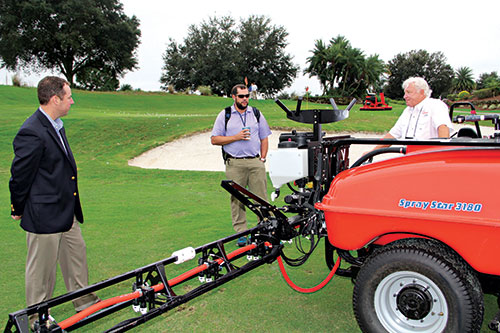 “The municipal business has really grown as youth sports have become more organized and professional,” says Miller. “Title IX was a great thing for those who make sports turf machinery. You added girls to the picture and we literally doubled the business.”
“The municipal business has really grown as youth sports have become more organized and professional,” says Miller. “Title IX was a great thing for those who make sports turf machinery. You added girls to the picture and we literally doubled the business.”
Smithco defined this sector as the sports market and once again began looking at what inefficiencies could be corrected. Simultaneously the company saw international interest in the growth market as golf was growing overseas, especially in southeast Asia. “Also, in less developed areas of the world,” says Miller. “Labor was mostly manually accomplished and there is a slow shift to machinery. It’s still cheaper to use labor, but machinery saves them a lot of time.”
As for the next 50 years of Smithco, Don assures, they won’t sell the company. “(Smithco’s) created quite a bottom line for profit. As long as the company is successful and making money there is no reason to sell it.”
For now, they honor Ted’s legacy and the success he initiated.
“It has grown from a single man with a single product, to a 50-year old company that makes a range of products,” says Miller.
Smithco innovates with data
As Smithco continues to develop new products, they have done so with select research programs. For Emil Miller, marketing manager, the collection of data not only improves the products they develop, it provides a compelling story for marketing.
“We talked to some people out in the field; talked to some Ph.D.s who wanted to do research to reduce disease reduction when using the roller,” says Miller. “We thought it would be a good idea and it’s been very successful for us.”
Smithco’s current research programs include:
University of Massachusetts
- Fairway Rolling, the Fairway Ultra 10, to reduce Dollar Spot. Beginning year three of program with Geunhwa Jung, Ph.D., associate professor, and James Popko, research assistant.
- Fairway Rolling, the Fairway Ultra 10 & 15, to reduce thatch levels. Year one of program with Geunhwa Jung, Ph.D., and James Popko.
Michigan State University
- Fairway Rolling, the Fairway Ultra 10, to assess golfers’ perception of ball roll and turf quality. Working with Thomas Nikolai, Ph.D.
University of Georgia
- Precision Sprayers, the Spray Star 2000 Star Command, to compare turf needs and prescription application of chemistry. Working with Henry Schaefer, Ph.D.
Photos: Smithco









